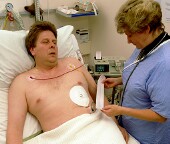- Double Mastectomy May Offer No Survival Benefit to Women With Breast Cancer
- Toxic Lead Found in Cinnamon Product, FDA Says
- Certain Abbott Blood Sugar Monitors May Give Incorrect Readings
- Athletes Can Expect High Ozone, Pollen Counts for Paris Olympics
- Fake Oxycontin Pills Widespread and Potentially Deadly: Report
- Shingles Vaccine Could Lower Dementia Risk
- Your Odds for Accidental Gun Death Rise Greatly in Certain States
- Kids From Poorer Families Less Likely to Survive Cancer
- Tough Workouts Won’t Trigger Cardiac Arrest in Folks With Long QT Syndrome
- At-Home Colon Cancer Test Can Save Lives
Heart-Rhythm Disorder Tied to Higher Risk of Heart Attack: Study


MONDAY, Nov. 4People with a heart-rhythm disorder called atrial fibrillation have a nearly two-fold increased risk of heart attack, and the risk is especially high in women and blacks, a new study finds.
About 3 million people in the United States have atrial fibrillation, a number expected to double in the next couple decades, said study lead author Dr. Elsayed Soliman, director of the Epidemiological Cardiology Research Center at the Wake Forest Baptist Medical Center in Winston-Salem, N.C.
Heart attack is a known risk factor for atrial fibrillation, but it wasn’t clear if the reverse was true. In order to answer that question, researchers looked at data from nearly 24,000 people, more than 1,600 of whom had atrial fibrillation.
There were about 650 heart attacks among all the study participants over seven years. The heart attack rate was nearly two times higher among people with atrial fibrillation than among those without the heart-rhythm disorder.
The results suggest a “bidirectional relationship” between heart attack and atrial fibrillation. That means that one can lead to the other, said the authors of the study, which was published online Nov. 4 in the journal JAMA Internal Medicine.
“[Atrial fibrillation] is a disease of aging and it is common, costly and has lots of complications,” Soliman said in a medical center news release. “Our study showed that patients with [atrial fibrillation] — especially women and African-Americans — are at an increased risk of heart attack compared to those without [atrial fibrillation].”
The findings add to the growing concerns of the seriousness of atrial fibrillation as a public-health burden, the researchers said.
The study found an association between atrial fibrillation and increased risk of heart attack, but it didn’t prove cause-and-effect.
More information
The U.S. National Heart, Lung, and Blood Institute has more about atrial fibrillation.
Source: HealthDay
Copyright © 2024 HealthDay. All rights reserved.










